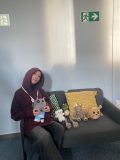Last week of the month, Thursday Meeting, we attended was highly productive. Throughout this meeting, we covered various important topics and gained new perspectives. In this meeting, we also briefly touched upon the topics discussed in the previous week.
First, we focused on the subject of judgment and interpretation. We emphasized the necessity of understanding others before passing judgment or making interpretations. This is a crucial skill both in personal relationships and professional life.
Next, we delved into the difference between objectivity and subjectivity. We understood that everyone perceives events through their own perspective, and therefore, subjectivity inevitably plays a role. Understanding this difference helps foster more open and empathetic communication.
Our second topic was Philip’s presentation on PSEA. PSEA stands for “Prevention of Sexual Exploitation and Abuse,” and it plays a critical role in the humanitarian aid sector.
Thanks to Philip’s presentation, we gained a better understanding of what PSEA is and why it is such a crucial issue. PSEA consists of a set of principles applied by aid organizations working in crisis and disaster zones to protect local communities and aid recipients from sexual exploitation and abuse.
The presentation provided detailed information about the fundamental principles and practices of PSEA. It explained how various measures can be taken to ensure that communities feel safe and that aid recipients are respected. This aims to enable aid workers to effectively deliver humanitarian assistance and empower local communities.
Later, we engaged in an interesting activity “Personal borders”
We used a rope to create a circle to visualize each other’s boundaries. We then attempted to breach these boundaries. This experience demonstrated that each of us has different boundaries and feelings, providing an opportunity to better understand one another. We emphasized the importance of recognizing and respecting our own boundaries, which we can apply in our daily lives to cultivate more positive relationships.
Finally, we established rules for our own group, taking important steps to manage our collaboration in a more effective and respectful manner. These rules encompass essential principles that allow each member to have their voice heard.

First and foremost, the rule of not interrupting someone while they are speaking is the cornerstone of respecting each member’s opinions. This fosters more effective communication and encourages everyone’s participation.
Being punctual and informing the group in the event of a maximum 10-minute delay on meeting days is a reflection of understanding the value of time. This rule ensures that meetings progress in an organized and efficient manner.
Rules such as the right to veto and the right to take breaks regulate group dynamics. These rules aim to promote healthier communication within the group and encourage each member to participate comfortably. As a result, we will have made our collaboration more effective and efficient.
Article Seda,
Volunteers of ESC project.
Thursday Meeting with our European Solidarity Corps volunteers from 26.10.2023.






















Comments by volunteerESC